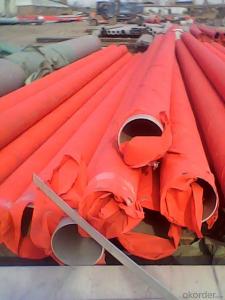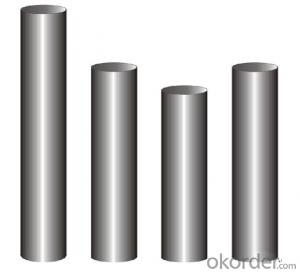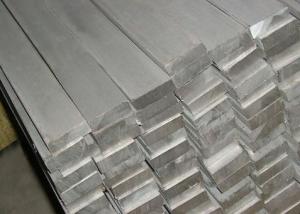PVC Coated Stainless Seamless Steel Tube
- Loading Port:
- Tianjin
- Payment Terms:
- TT or LC
- Min Order Qty:
- 25 m.t.
- Supply Capability:
- 10000 m.t./month
OKorder Service Pledge
OKorder Financial Service
You Might Also Like
We are company that have many years experience and professional manager team and engineer team and sales team, sure we will provide you high quality of pipe and professioanl service.
Seamless pipe possesses a hollow section and without seam around the strip steel. It is made with solid bar or steel ingot by perforating machine. As the facture process does not include any welding, seamless pipes are considered to be stronger and more durable. Generally speaking, seamless pipe has better pressure resistance and security than other classifications, and was usually more easily available than welded pipe.
2、Main Features of the Seamless Pipe:
• High working accuracy
• High strength
• Small inertia resistance
• Strong therming dissipine ability
• Good appearance
• Reasonble price
3、Seamless Pipe Specification:
Standard | GB, DIN, ASTM ASTM A106-2006, ASTM A53-2007 |
Grade | 10#-45#, 16Mn 10#, 20#, 45#, 16Mn |
Thickness | 8 - 33 mm |
Section Shape | Round |
Outer Diameter | 133 - 219 mm |
Place of Origin | Shandong, China (Mainland) |
Secondary Or Not | Non-secondary |
Application | Hydraulic Pipe |
Technique | Cold Drawn |
Certification | API |
Surface Treatment | factory state or painted black |
Special Pipe | API Pipe |
Alloy Or Not | Non-alloy |
Length | 5-12M |
Outer Diameter | 21.3-610mm |
Grade | 20#, 45#, Q345, API J55, API K55, API L80, API N80, API P110, A53B |
Standard | ASME, ASTM |
1) Material:20#(ASTM A 106/A53 GRB.API5LGRB,GB),45#,16Mn,10#.
2) Specification range: OD: 21.3-610mm, WT:6-70mm, length:6-12m or according to the requirement of clients.
3) Executive standards: GB, ASME API5L.ASTM A 106/A53,Despite of the above standards, we can also supply seamless steel pipe with standard of DIN, JIS, and so on, and also develop new products according to the requirements of our clients!
4) Surface: black lacquered, varnish coating or galvanized.
5) Ends: Beveled or square cut, plastic capped, painted.
6) Packing: bundles wrapped with strong steel strip, seaworthy packing.
4、Packaging & Delivery:
Packaging Details: | seaworthy package, bundles wrapped with strong steel strip |
Delivery Detail: | 15-30days after received 30%TT |
5、FAQ of Seamless Pipe:
①How is the quality of your products?
We have many years business experience in this area, and we have professional engineer and manager team and sure we can provide you high quality production and professional service.
②How about price?
Yes, we are factory and be able to give you lowest price below market one, and we have a policy that “ for saving time and absolutely honest business attitude, we quote as lowest as possible for any customer, and discount can be given according to quantity”,if you like bargain and factory price is not low enough as you think, just don’t waste your time.Please trust the quotation we would give you, it is professional one.
③Why should you chose us?
We can give you both.Additionally, we can also offer professional products inquiry, products knowledge train(for agents), smooth goods delivery, exellent customer solution proposals.Our service formula: good quality+good price+good service=customer’s trust
SGS test is available, customer inspection before shipping is welcome, third party inspection is no problem.
6、Seamless Pipe Images:
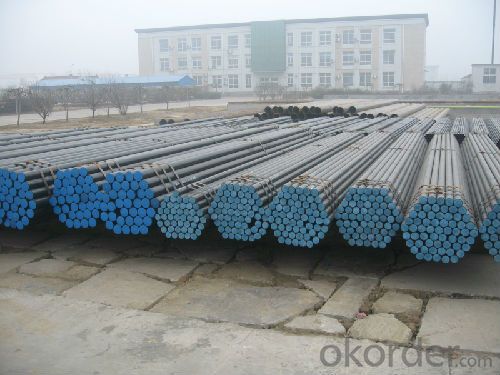
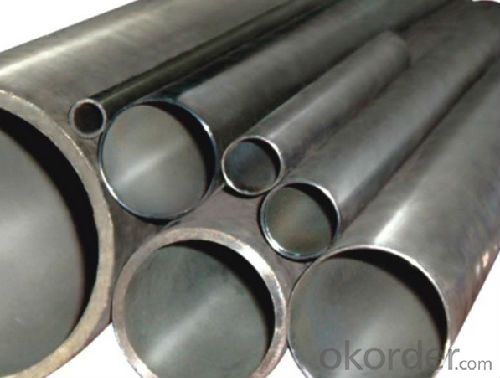
- Q:SA-179 what kind of material is steel pipe?
- SA179 corresponds to China's material is GB8163 10# seamless steel pipe.
- Q:Are stainless steel pipelines buried in need of corrosion protection?
- The factors of the material itself: stainless steel pipe structure exists because of the equipment, or the existence of cracks of metal or non-metal deposits on the surface, in the sediment and the stainless steel tube surface in the formation of cracks, corrosion, will give priority to produce punctate and ulcer like damage in the crevice, which is crevice corrosion.
- Q:What are the common joining methods for stainless steel pipes?
- The common joining methods for stainless steel pipes include welding, threaded connections, and flanged connections.
- Q:What is the tensile strength of stainless steel pipes?
- The tensile strength of stainless steel pipes can vary based on the specific grade and composition of the steel. However, stainless steel is renowned for its high tensile strength, making it a popular choice for various applications that demand sturdy and long-lasting pipes. On average, stainless steel pipes possess a tensile strength that falls within the range of 500 to 1500 megapascals (MPa). Thanks to this remarkable tensile strength, stainless steel pipes can endure substantial pressure and stress, rendering them suitable for utilization in industries like construction, oil and gas, chemical processing, and automotive manufacturing. It is worth noting that the precise tensile strength of stainless steel pipes can be influenced by factors such as the manufacturing process, heat treatment, and any additional alloying elements present in the steel. Consequently, referring to the specific technical specifications or standards for the particular grade of stainless steel pipes is crucial in order to ascertain their exact tensile strength.
- Q:What is the maximum pressure rating for stainless steel pipes?
- The maximum pressure rating of stainless steel pipes can vary due to several factors, including the stainless steel grade, pipe diameter and wall thickness, and specific application or industry requirements. Nonetheless, stainless steel pipes are renowned for their exceptional strength and resistance to corrosion, making them ideal for high-pressure applications. Generally, stainless steel pipes can withstand maximum pressure ratings ranging from a few hundred psi to several thousand psi. To determine the precise maximum pressure rating for a specific stainless steel pipe in a given application, it is imperative to refer to the relevant industry standards, codes, and specifications or seek guidance from a qualified engineer or manufacturer.
- Q:Are stainless steel pipes suitable for food processing industries?
- Indeed, stainless steel pipes prove to be an impeccable choice for food processing industries. The impeccable corrosion resistance, durability, and hygienic attributes of stainless steel render it the preferred material in these sectors. Remarkably, stainless steel pipes exhibit no reactivity with food or any propensity to alter its flavor, while effectively resisting staining, rusting, and chemical harm. Hence, they emerge as an ideal medium for the transportation of diverse food products, encompassing liquids, gases, and solids. Furthermore, the effortless cleaning and maintenance of stainless steel pipes mitigate the risk of contamination and guarantee the safety of food.
- Q:Stainless steel pipes can not be less than the amount of chromium
- 304 stainless steel tube as 304 steel pipe, in the dry clean atmosphere, have absolutely excellent anti-corrosion ability, but it will be moved to the beach area, with large amounts of sea salt fog, will rust quickly; and the good performance of 316 steel pipe. Therefore, it is not any kind of stainless steel, capable of corrosion and rust in any environment. Stainless steel is a very thin layer formed on the surface and the stability of the fine solid chromium rich oxide film (protective film), to prevent the infiltration of oxygen atoms, to oxidation, and the ability to obtain anti-corrosion. Once there are some reasons, this film was constantly destroyed, air or liquid oxygen atoms will continue to infiltrate or metal atoms of iron to keep out from the loose formation of iron oxide, the metal surface will be continuously corroded. Many of the surface damage form, more common in daily life are as follows: 1. stainless steel surface deposited dust or heterogeneous metal particles containing other metal elements of the attachment, in the humid air, condensed water and adhesion between the stainless steel, the two together into a micro battery, cause the electrochemical reaction, the film has been destroyed, called electrochemical corrosion. 2. stainless steel surface adhesion of organic juice (such as vegetables, soup, sputum), oxygen in the water under the circumstances, a long time, organic acid, organic acid on the surface of metal corrosion. 3., stainless steel surface adhesion contains acid, alkali and salt substances (such as decoration wall caustic soda, lime water splash), causing local corrosion. 4., in polluted air (such as containing large amounts of sulfide, carbon dioxide and nitrogen oxides in the atmosphere), in case of condensation water, the formation of sulfuric acid, nitric acid, acetic acid liquid point, causing chemical corrosion.
- Q:Can stainless steel pipes be used for nuclear power plants?
- Yes, stainless steel pipes can be used for nuclear power plants. Stainless steel is commonly used in nuclear power plants due to its excellent corrosion resistance, high strength, and heat resistance properties. It is suitable for transporting various fluids and gases within the plant, including coolant, steam, and chemicals. Additionally, stainless steel's durability and ability to withstand extreme conditions make it a reliable choice for nuclear power plant applications.
- Q:Can stainless steel pipes be used for geothermal heating systems?
- Yes, stainless steel pipes can be used for geothermal heating systems. Stainless steel is a popular choice for geothermal applications due to its superior corrosion resistance properties. Geothermal heating systems involve the transfer of heat from the ground to the building, and stainless steel pipes are highly resistant to the corrosive effects of the soil and water found in geothermal environments. Additionally, stainless steel pipes can withstand high temperatures and pressure, making them suitable for the demanding conditions of geothermal systems. The durability and longevity of stainless steel pipes also make them a cost-effective choice for geothermal heating systems, as they require minimal maintenance and have a long lifespan.
- Q:Can stainless steel pipes be used for irrigation well systems?
- Yes, stainless steel pipes can be used for irrigation well systems. Stainless steel is highly resistant to corrosion and can withstand various environmental conditions, making it a suitable choice for irrigation applications. Additionally, stainless steel pipes offer long-term durability and maintain the quality of water being transported, ensuring efficient irrigation system performance.
1. Manufacturer Overview |
|
|---|---|
| Location | |
| Year Established | |
| Annual Output Value | |
| Main Markets | |
| Company Certifications | |
2. Manufacturer Certificates |
|
|---|---|
| a) Certification Name | |
| Range | |
| Reference | |
| Validity Period | |
3. Manufacturer Capability |
|
|---|---|
| a)Trade Capacity | |
| Nearest Port | |
| Export Percentage | |
| No.of Employees in Trade Department | |
| Language Spoken: | |
| b)Factory Information | |
| Factory Size: | |
| No. of Production Lines | |
| Contract Manufacturing | |
| Product Price Range | |
Send your message to us
PVC Coated Stainless Seamless Steel Tube
- Loading Port:
- Tianjin
- Payment Terms:
- TT or LC
- Min Order Qty:
- 25 m.t.
- Supply Capability:
- 10000 m.t./month
OKorder Service Pledge
OKorder Financial Service
Similar products
New products
Hot products
Hot Searches
Related keywords
